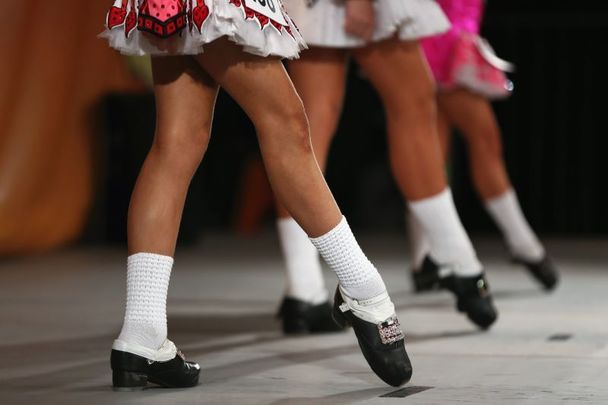An Coimisiún Le Rincí Gaelacha (CLRG), the oldest and largest competitive Irish dance organization in the world, will continue to allow competitors to compete under the gender they identify with in their daily lives.
“CLRG is committed to creating a safe and inclusive environment for every dancer in our community," a spokesperson for CLRG told IrishCentral on Wednesday.
“Dancers enter competitions that align with their gender identity, dancing and competing as the gender they identify as in their daily life.
“A motion seeking to enforce dancers to compete in the competition that corresponds to their biological sex was recently defeated by a CLRG Membership vote.
“A formal CLRG Inclusivity, Equality, and Diversity (IED) policy is currently under review and will be presented to Members and voted on in May.
“The goal is to provide a clear and robust IED policy that will help guide Members and Teachers in maintaining a welcoming dance community for all, where Irish dance can be celebrated.”
The spokesperson confirmed that the vote took place on Monday after the most recent CLRG Membership meeting.
IrishCentral has reached out to Sandra Connick, the chairperson of CLRG, for further comment.
The matter of Irish dancers competing under the gender they identify with exploded late last year after a transgender teenage dancer, who previously competed in the boys category, won her age group at the Southern Region Oireachtas, a qualifying event for CLRG's more elite North American Irish Dancing Championships and World Irish Dancing Championships.
Before the Southern Region Oireachtas began, PJ McCafferty, the Director of the Southern Region, a subset of the Irish Dance Teachers Association of North America (IDTANA), which works in tandem with CLRG, publicly clarified that precedent had already been set regarding dancers competing in the gender category they identify with.
“Entering and competing in the CLRG World Championship competition that corresponds to the gender identity of the dancer is an established CLRG precedent, it has been done before,” McCafferty said in a statement that was issued on the IDTANA-Southern Region’s Facebook page in late November.
“A dancer must qualify for the specific World Championship competition in which they will dance. CLRG controls Oireachtas Rince na Cruinne [World Irish Dancing Championships] and the process of qualifying to compete for the CLRG World Championship. The Southern Region is obligated to follow CLRG policy.
“Similarly, entering in the Regional Qualifier competition that corresponds to the gender identity of a dancer is an established precedent for IDTANA competitions, it has been done before including in the IDTANA-Southern Region Oireachtas."
(Notably, IDTANA says it has a policy "not to allow or engage in discrimination against, or harassment of, any person" on a number of bases, including sex and gender identity.)
McCafferty added: “I am writing this post to remind everyone that we teach all the dancers. We advocate for every one of our dancers. We do our very best to be fair to everyone. This situation is not easy for anyone. Not everyone’s point of view or personal interests align. I am asking for your tolerance. You are expected to respect all the dancers."
Still, the debate intensified - some argued that transgender Irish dancers should be permitted to compete under the gender they identify with, while others argued that a separate ‘trans’ or 'non-cis' category should be created for competitions.
The debate spread outside the often insular world of competitive Irish dance when The Daily Signal ran an article entitled “Parents Outraged After Trans-Identifying Boy Wins Girls’ Irish Dancing Competition, Heads to Worlds.” The article went on to be cited by several other conservative outlets - one baselessly claimed the new Oireachtas champion "wanted to dance in the girls' competitions for better results."
As the debate gained media attention, two separate petitions were launched online - “Protect Female Irish Dancers in Gender-Specific World Qualifying Championships Worldwide” and another “Support Transgender Irish Dancers.”
At the time of publication on Wednesday night, the “Protect Female Irish Dancers” petition had garnered more than 6,400 signatures, while the “Support Transgender Irish Dancers” petition had drawn more than 7,200 signatures.
Gabrielle Siegel, the adult Irish dancer who launched the “Support Transgender Irish Dancers” petition in December, previously told IrishCentral that she was motivated to launch the petition after she saw many people speaking out in favor of trans dancers on social media and out of fear that CLRG, IDTANA, and the Southern Region would only hear the opposing viewpoint.
"I knew we had to find a way to organize our support and show definitively that the Irish dance community stood proudly behind our trans community members," Siegel told IrishCentral.
Siegel said that she consulted with a friend, a trans Irish dancer, to write the open letter that's featured in the petition, though the final petition is published under her name.
"Unfortunately, a lot of trans dancers face a lot of backlash when they speak on these issues," Siegel said, "so we felt it would be safest to do everything under my name."
Siegel said on Wednesday that she sent the petition to Sandra Connick (the chairperson of CLRG), Lisa Petri (President of IDTANA), and McCafferty twice - once on January 10, and the second time, late last week, she sent the petition with its additional 900 signatures as well as documentation of the comments the petition had received. Siegel said she received confirmation of receipt both times.
While it's unclear how much or how little impact either petition had on CLRG's recent vote, Siegel told IrishCentral that the decision made by membership this week is a “huge relief.”
"While this should never have been up for debate, given both the existing policy and our sport's commitment to inclusivity, it is cause for immense celebration to see our community reaffirm its commitment to our trans community members - something we, unfortunately, can't take for granted in today's world," Siegel said.
"I couldn't be more proud of how the Irish dancing community – dancers, teachers, and leadership – has steadfastly stood together for equality these past few weeks and months.
"And while it has been an intense time, the work to make this happen began years ago with trans dancers who fought bravely and tirelessly for their right to compete as they are. So many members of our community worked so hard to make this happen, and I am grateful every day to stand by them. I don't take anybody's work for granted."
Siegel added: "Irish dance stands for love and acceptance, and I am hopeful that this decision will usher in a new era where trans dancers are not only supported explicitly on an institutional level, but where it is made clear that bigotry is never acceptable in our community."




Comments